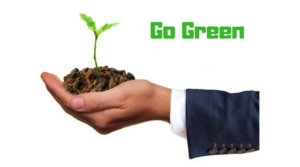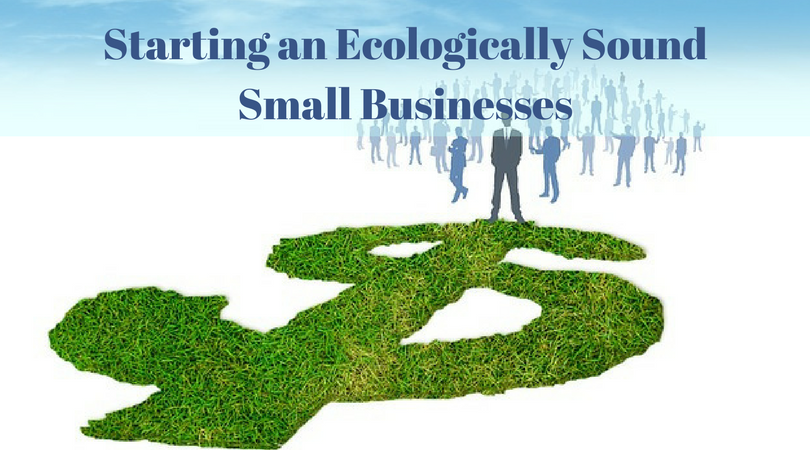Like every story, there are two sides – on the one hand, individuals look to corporates as the entities that need to be held to account, but on the other hand, all the actions we take as individuals, although seemingly insignificant in themselves, can as a whole have an equally significant effect. If you want to make a difference as an individual, you have the opportunity to do your bit with actions such as recycling, cutting waste, reducing your reliance on fossil fuels and getting involved in conservation projects.
If you have an entrepreneurial spirit, you could consider taking it a step further and starting an ecologically sound small business.
Planning and funding
There are several areas you could consider for your eco-venture, depending on where your interest lies. One thing they will all have in common though is that just like any other business, yours will need a plan that covers your budget, your marketing, how the business will be run, where the money will be made and where the investment will come from. It might sound dull thinking about projections and profit margins and the like when you’re trying to do your bit to save the world, but unless you pay attention to getting these aspects of your business right, you won’t stand much chance of success.
If you’re self-funding, which is perfectly possible in certain sectors, you need to ensure you have the funds to cover your required investment in set-up costs and marketing, plus ongoing expenses for the period it takes before you start to turn a profit. Savings and investments can be made to work for you, and you also have the option of taking out business or online loans like the emprestimo online agora financial service. It’s worth investigating what eco grants or funds you are eligible for, because there are many foundations, charities and other funding sources that make money available for green business projects.
Turning your hobby into a green business
 One way of moving into an eco-business is to turn your hobby into a business. For example, many crafts have good green credentials, as they often use natural, sustainable materials and local supply cuts the carbon footprint of goods. So, if you spin your own wool, use natural dyes and knit beautiful clothes from your raw materials, you have the basis for a viable business. Smallholdings are often a hobby rather than a business, but if you have the capability, there are opportunities to make money from them. Selling fresh, free-range eggs, for example, can build into a sizeable income if you can upscale from selling a couple of dozen a day from the front of your house to supplying local stores and restaurants.
One way of moving into an eco-business is to turn your hobby into a business. For example, many crafts have good green credentials, as they often use natural, sustainable materials and local supply cuts the carbon footprint of goods. So, if you spin your own wool, use natural dyes and knit beautiful clothes from your raw materials, you have the basis for a viable business. Smallholdings are often a hobby rather than a business, but if you have the capability, there are opportunities to make money from them. Selling fresh, free-range eggs, for example, can build into a sizeable income if you can upscale from selling a couple of dozen a day from the front of your house to supplying local stores and restaurants.
There are a few ethical considerations when it comes to rearing livestock, for instance, the methane produced by cows that contributes to climate change, and the debate about how much food cattle eat to produce each pound of meat, compared to what could be grown as crops from the same piece of land.
Whether these issues concern you or not, from a pragmatic point of view, the demand for animal products isn’t going to disappear overnight. If you are rearing your animals with care and allowing them to live as natural a life as possible, you will at least be producing high welfare products, which has got to be an improvement over factory farming methods.
Other ideas for eco businesses
If you’re of a more traditional business mind, i.e. retail, e-commerce and so on and wouldn’t know a Pekin from a Rhode Island Red, then you could look at sourcing sustainable products, or manufacturing them yourself. Toilet tissue is a good example, as millions of trees are cut down every year just to make paper for people to use when they go to the bathroom. If you feel passionately that this is wrong, then you’re not alone. That means there is a market for good quality recycled or sustainably produced toilet rolls, and you could find a niche within this market. If you have a particular bugbear when it comes to ecologically unsound products, see if there is an opportunity to introduce an alternative to the market. Plastic waste is becoming a major global issue around the world, so any viable alternatives for packaging etc. could be a worthwhile investment. It may seem like the energy market is somewhat saturated, and that there are few opportunities for a small business to move in on this market, but you could find there is a trick the bigger companies are missing that you could claim as your own. The advantage of an established sector like energy is that the requirement for the end product will never disappear, which means there will always be a demand.
A couple of things to bear in mind
If you’re planning an eco-friendly business, then you must be able to verify any ecological claims you make, and that means ensuring that all your sources are legitimate and are genuinely selling you organic feed or Fairtrade coffee beans for example. You also need to look at every element of how your business runs to make sure you’re not being eco-friendly in public and then producing tons of pollutants behind the scenes. Green businesses tend to be ethically as well as ecologically sound, and it’s something customers have come to expect, so you need to take this into consideration as well when sourcing products and importing goods.
Starting any business is a thrilling and rewarding experience. Starting your own eco-friendly business will give you the double satisfaction of being your own boss and earning a decent living whilst also helping to conserve the world’s natural resources and protect them from the harmful influence of human activity.
P.S: Please add your comments below and let us know if this article was helpful for you. Also, join our EAT FREE Community for more learning opportunities, where you can make a little bit of money, making the planet better.




Yeah!
this is nice article,I get to know many new things.
And I hope it will be more helpful for me.
thanks for this article,